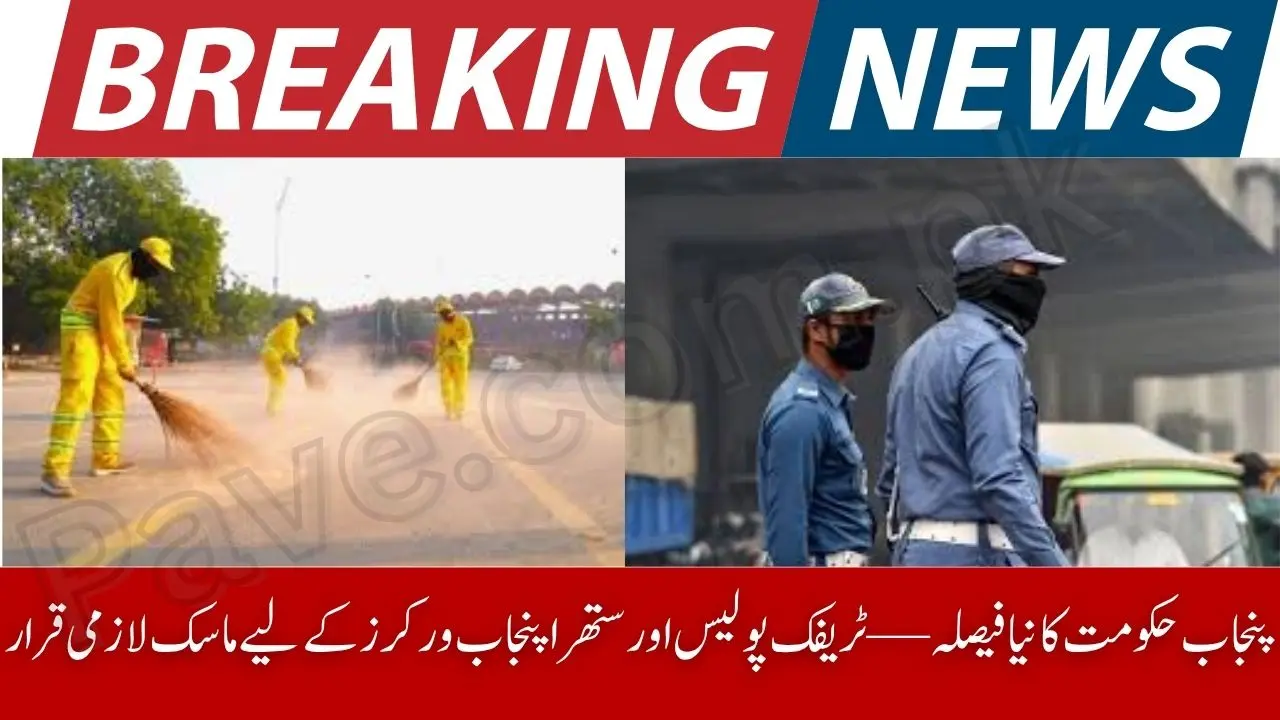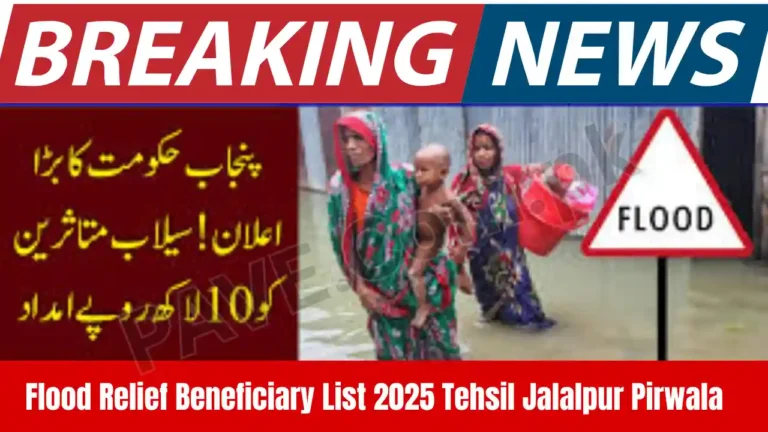Breaking: Punjab Makes Masks Mandatory for Traffic Police and Suthra Punjab Workers
Punjab Makes Masks Mandatory for Traffic Police and Suthra Punjab Workers under a new government directive issued by Chief Minister Maryam Nawaz Sharif, aiming to protect frontline staff from the rising levels of smog and air pollution across the province.
The decision marks a critical step in safeguarding thousands of outdoor workers, including traffic wardens and sanitation teams, who are most exposed to harmful air conditions in Punjab’s major cities.
This mandatory rule marks a major step in Punjab’s ongoing efforts to protect public servants and citizens from environmental hazards during the peak smog season.
Punjab Government Issues Official Notification
According to the official notification, all traffic wardens, inspectors, and sanitation staff must wear masks during working hours. The order applies to every district in Punjab, particularly in cities like Lahore, Faisalabad, Gujranwala, and Multan, where the Air Quality Index (AQI) has repeatedly reached hazardous levels above 300.
Authorities stated that this measure is part of a broader Smog Prevention and Public Health Plan 2025, initiated by the Punjab Chief Minister to minimize the health impacts of pollution on outdoor workers.
Maryam Nawaz Directs Strict Implementation
Chief Minister Maryam Nawaz Sharif personally instructed the Home Department, Local Government Department, and Traffic Police authorities to ensure full compliance with this safety regulation.
“Our traffic police and sanitation workers are the backbone of our public services. Their safety is our priority,”
said CM Maryam Nawaz in her directive to departments.
The order also highlights that senior officers must monitor compliance daily and submit reports to the provincial administration. Departments have been warned that non-compliance will not be tolerated.
Check Also: Pakistan Passport Ranking 2025 – Global Position & Updated Visa-Free Countries List
Why Face Masks Are Now Mandatory
The government’s decision comes as Punjab continues to face dangerous smog levels caused by a combination of vehicle emissions, crop residue burning, and industrial pollution.
Key Health Risks Identified:
- Respiratory illnesses such as asthma and bronchitis
- Eye irritation and throat infections
- Reduced visibility leading to road accidents
- Long-term lung damage due to fine particulate matter
Officials noted that traffic police wardens spend long hours at intersections breathing in vehicle exhaust fumes, while Suthra Punjab teams work near open garbage and industrial waste — both high-risk environments.
By enforcing mask usage, Punjab aims to reduce respiratory disease cases among workers and improve occupational safety standards.
Departments Covered Under the Rule
The directive applies to:
- Punjab Traffic Police Department
- Suthra Punjab Sanitation Teams
- Municipal Corporations and Waste Management Companies
Each department has been instructed to procure and distribute protective masks — preferably N95 or medical-grade respirators — to all on-duty staff.
Officials from the Local Government & Community Development Department (LGCD) confirmed that reusable and washable masks will be provided to sanitation workers to ensure long-term use and sustainability.
Monitoring and Disciplinary Action
Senior officials, including Chief Traffic Officers (CTOs) and Waste Management Supervisors, are required to enforce this rule across all zones.
Regular field inspections will be conducted by district officers, and any staff member found without a mask during duty hours may face:
- Written warning or service memo
- Salary deduction for repeated violations
- Possible suspension under departmental policy
The order also encourages citizens to cooperate and report violations via the Punjab government’s helpline and Dastak app.
Smog Control Under the Maryam Nawaz Administration
The mask mandate is part of Punjab’s comprehensive Smog Prevention and Air Quality Improvement Program, which includes several recent initiatives:
| Initiative | Description | Responsible Department |
|---|---|---|
| Closure of smoke-emitting factories | Crackdown on illegal brick kilns | Environment Department |
| Anti-smog squads in major cities | Real-time monitoring of pollution | EPA Punjab |
| Awareness campaigns | School & public sensitization drives | School Education Department |
| Vehicle fitness checks | Emission control inspections | Transport Department |
| Mandatory masks for outdoor workers | Worker safety and pollution prevention | LG & Traffic Police |
These combined steps aim to make Punjab a smog-resilient province by 2026, aligning with the Clean Punjab 2030 Vision.
Suthra Punjab Programme — Keeping Cities Clean
The Suthra Punjab Programme, launched earlier in 2025, employs thousands of sanitation workers who keep cities clean by managing waste and maintaining public hygiene.
Under this new rule, all such workers must wear masks during sweeping, waste collection, and disposal. The Local Government Department emphasized that this measure not only protects workers from smog but also from dust, bacterial exposure, and biohazardous materials.
District administrations will be responsible for supplying protective gear, conducting health checkups, and maintaining attendance records for compliance tracking.
Check Also: PM Shahbaz Sharif Student Card 2025 – Registration, Eligibility & Benefits Explained
Traffic Police at the Frontline of Pollution Exposure
Traffic wardens are among the most exposed to Punjab’s polluted air. Many officers spend over 8 to 10 hours daily directing traffic amid heavy emissions.
In cities like Lahore and Gujranwala, the AQI has crossed 350–400, posing serious health threats.
This new directive mandates that each traffic official wears a protective mask at all times, especially during peak traffic hours and smog alerts.
Officials believe this will reduce the number of pollution-related sick leaves among officers and enhance their ability to work safely on roads.
Check ALso: Breaking: Punjab Receives 87 Electric Buses From China for Twin Cities Transport
Expert Opinions on Punjab’s Mask Mandate
Health experts from the Punjab Institute of Public Health (PIPH) have applauded the government’s proactive approach.
Dr. Nadia Anwar, an environmental health specialist, stated:
“Continuous exposure to toxic air can reduce lung capacity over time. Wearing N95 masks is the simplest and most effective defense. Punjab’s decision sets a benchmark for other provinces.”
Environmental activists also lauded the step, urging the government to expand mask distribution to students, rickshaw drivers, and delivery riders — groups equally vulnerable to pollution exposure.
Future Plans Under Punjab Smog Prevention 2025
Officials hinted that this new rule is only the beginning. The next phase of Punjab’s air quality initiative will introduce:
- Real-time air monitoring apps for public awareness
- Free mask distribution booths at traffic signals
- Incentives for electric bikes and buses
- Subsidies for green fuel conversions
By combining health safety, clean transport, and digital enforcement, Punjab aims to create a modern, eco-friendly environment across its cities.
Public and Social Media Reactions
Citizens have largely welcomed the decision, with many praising Maryam Nawaz for prioritizing public health.
Social media platforms are filled with appreciation posts showing traffic wardens wearing masks under the hashtag #CleanPunjab and #SmogFreePunjab.
Environmental groups have urged other provinces to replicate Punjab’s model, calling it a necessary step to save workers’ lives and improve urban air quality.
Conclusion – Punjab Makes Masks Mandatory for Traffic Police and Suthra Punjab Workers
The mandatory mask directive for Traffic Police and Suthra Punjab workers demonstrates the Punjab government’s serious commitment to tackling pollution and protecting its workforce.
As smog continues to pose a health threat, the move will help reduce respiratory diseases, boost worker safety, and raise public awareness about environmental responsibility.
Under Maryam Nawaz’s leadership, Punjab is taking bold, practical steps toward a cleaner, healthier, and safer province for everyone.







